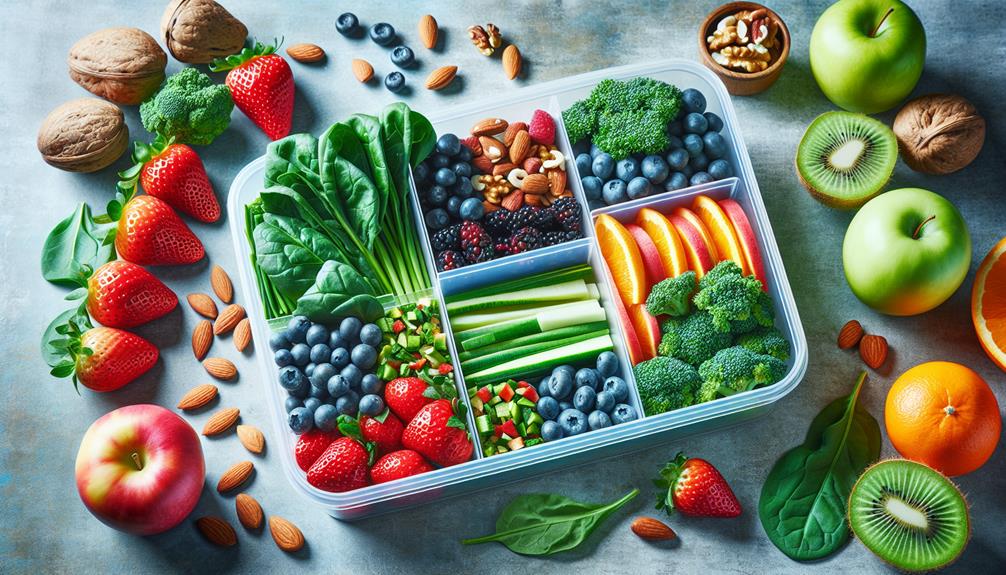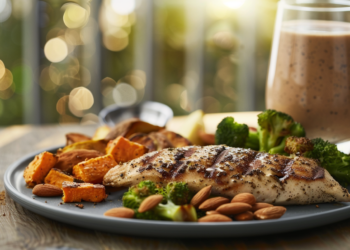If you've ever experienced joint pain or bloating after a meal, you might be familiar with the effects of inflammation on the body. But did you know that your diet plays a significant role in either fueling or fighting inflammation?
By making simple changes to what you eat, you can actively support your body in its battle against inflammation. So, how can you tweak your meals to promote an anti-inflammatory lifestyle and potentially improve your overall well-being?
Key Takeaways
- Incorporate anti-inflammatory foods like turmeric and ginger into your diet.
- Avoid pro-inflammatory foods such as refined carbohydrates and sugary beverages.
- Utilize herbs and spices like garlic and cinnamon for their anti-inflammatory properties.
- Plan meals with whole grains, healthy fats, colorful fruits, and lean proteins to combat inflammation.
Understanding Inflammation and Its Impact
To truly grasp the significance of inflammation on your health, envision it as a relentless fire burning within your body, fueled by various triggers and responses. Inflammation is a natural immune response designed to protect your body from harmful stimuli like pathogens, injuries, or irritants. However, when this response becomes chronic due to factors like poor diet, stress, lack of exercise, or smoking, it can lead to a cascade of negative effects on your overall health and wellness.
Chronic inflammation is linked to various diseases such as heart disease, diabetes, arthritis, and even cancer. It can disrupt the balance of hormones, increase the risk of autoimmune conditions, and impair the function of vital organs. Understanding the basics of inflammation and its causes is crucial in managing and preventing these detrimental effects.
Key Anti-Inflammatory Foods to Include
Including key anti-inflammatory foods in your diet can play a significant role in reducing inflammation and promoting overall health and wellness. Here are some essential foods to consider:
- Turmeric: This bright yellow spice contains curcumin, a potent anti-inflammatory compound that has been shown to help reduce inflammation in the body. Adding turmeric to your dishes or consuming it as a supplement can be beneficial.
- Ginger: Another powerful anti-inflammatory spice, ginger contains gingerol, which has been studied for its potential to reduce inflammation and offer pain relief. You can use fresh ginger in cooking, make ginger tea, or take ginger supplements.
- Omega-3 Fatty Acids**: Found in fatty fish like salmon, mackerel, and sardines, as well as in chia seeds and walnuts, omega-3s have anti-inflammatory properties that can help lower inflammation levels in the body.
- Antioxidant-Rich Foods**: Berries, leafy greens, and nuts are examples of foods rich in antioxidants that can combat oxidative stress and reduce inflammation. Incorporating these foods into your diet can contribute to an anti-inflammatory lifestyle.
Harmful Pro-Inflammatory Foods to Avoid

Unhealthy dietary choices can significantly contribute to inflammation in your body, making it essential to be mindful of harmful pro-inflammatory foods to avoid. Some common inflammatory food culprits that you should steer clear of include refined carbohydrates, sugary beverages, red and processed meats, and trans fats. These items are known dietary inflammation triggers that can exacerbate inflammatory processes in the body.
To help you make better food choices, here is a breakdown of harmful pro-inflammatory foods to avoid:
| Category | Pro-Inflammatory Foods |
|---|---|
| Refined Carbohydrates | White bread, pastries |
| Sugary Beverages | Soda, energy drinks |
| Red and Processed Meats | Hot dogs, bacon |
| Trans Fats | Margarine, fried fast food |
Incorporating Anti-Inflammatory Herbs and Spices
Incorporate a variety of anti-inflammatory herbs and spices into your daily meals for added flavor and potential health benefits. Herbal remedies and spice combinations have been used for centuries to aid in reducing inflammation in the body. Here are some beneficial options to consider:
- Turmeric: Contains curcumin, a powerful anti-inflammatory compound that can help reduce inflammation.
- Ginger: Known for its anti-inflammatory properties, ginger can be added to stir-fries, teas, or smoothies.
- Garlic: Contains sulfur compounds that have anti-inflammatory effects and can be used in various dishes.
- Cinnamon: Not only adds a sweet flavor but also has anti-inflammatory properties that can help combat inflammation in the body.
Meal Planning for an Anti-Inflammatory Diet

To support your anti-inflammatory lifestyle, strategize your meals with a focus on nutrient-dense foods and balanced combinations that can aid in reducing inflammation in your body. When planning your meals, consider incorporating ingredient swaps to boost anti-inflammatory properties. For example, replace refined grains with whole grains like quinoa or brown rice, and opt for healthy fats such as olive oil or avocado instead of saturated fats.
To enhance the flavor profiles of your anti-inflammatory meals, experiment with herbs and spices like turmeric, ginger, garlic, and cinnamon. These ingredients not only add a delicious taste but also offer anti-inflammatory benefits. Additionally, aim to include a variety of colorful fruits and vegetables rich in antioxidants to further combat inflammation.
| Anti-Inflammatory Ingredient Swaps | Flavor-Boosting Herbs and Spices |
|---|---|
| Whole grains (quinoa, brown rice) | Turmeric |
| Healthy fats (olive oil, avocado) | Ginger |
| Colorful fruits and vegetables | Garlic |
| Lean proteins (salmon, tofu) | Cinnamon |
Frequently Asked Questions
Can Stress and Lack of Sleep Contribute to Inflammation in the Body?
Yes, stress and lack of sleep can contribute to inflammation in your body. Prioritize stress management, improve sleep quality, exercise regularly, and practice mindfulness to reduce inflammation. These lifestyle changes can positively impact your overall health.
How Does Alcohol Consumption Affect Inflammation Levels?
Alcohol consumption can increase inflammation levels in your body. Studies show that excessive drinking can disrupt your immune response, leading to heightened inflammation. Moderation is key; limit alcohol intake to support a healthier inflammatory balance.
Are There Specific Cooking Methods That Can Help Retain the Anti-Inflammatory Properties of Foods?
When cooking, opt for methods like steaming, sautéing, or roasting with minimal oil to retain food's anti-inflammatory properties. Avoid deep-frying or charring, which can create harmful compounds. Prioritize gentle cooking techniques for a healthier meal.
Can Supplements Like Turmeric or Fish Oil Help Reduce Inflammation?
You're curious if turmeric or fish oil can help with inflammation. Turmeric benefits are known for their anti-inflammatory properties, while fish oil's omega-3 fatty acids can also aid in reducing inflammation. Incorporating them may offer some relief.
Is Intermittent Fasting Beneficial for Reducing Inflammation in the Body?
Intermittent fasting may aid in inflammation reduction by impacting the body's inflammatory response. It can positively influence your dietary habits and potentially contribute to a healthier inflammatory profile. Consider incorporating this practice for potential anti-inflammatory benefits.
Conclusion
Incorporating anti-inflammatory foods and herbs into your diet can help reduce inflammation in the body and improve overall health. By focusing on whole, nutrient-dense foods and avoiding processed, pro-inflammatory foods, you can support your body's natural healing processes.
Remember, small changes in your diet can have a big impact on inflammation levels, so start making healthier choices today for a happier, healthier tomorrow.













